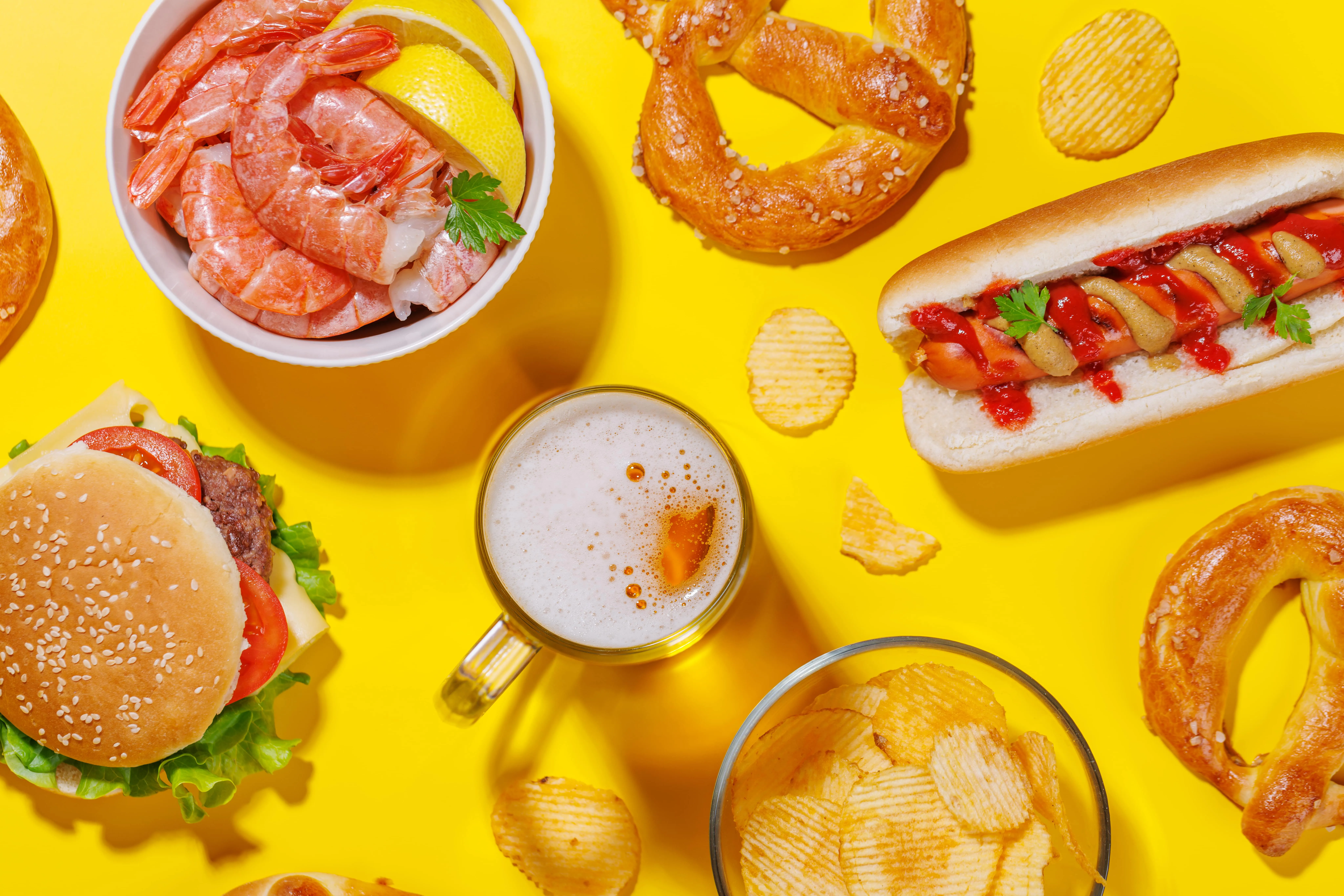Key Takeaways
- Ultra-processed foods are linked to early signs of Parkinson’s disease, including nonmotor symptoms like depression, constipation, and reduced sense of smell, new research shows.
- A growing body of evidence connects long-term consumption of UPFs to higher risks of hypertension, cardiovascular disease, cancer, digestive disorders, and all-cause mortality.
- Reducing UPF consumption, even by small amounts, and replacing it with whole, nutrient-dense foods may help lower the risk of Parkinson’s disease and protect overall brain health.
{{mid-cta}}
Over the last decade, ultra-processed foods have quietly become a staple on our plates. These foods are convenient, tasty, and everywhere. But recent studies are raising serious concerns about their effects on brain health, especially their potential role in the development of Parkinson’s disease.
A new study published in Neurology found that people who consumed 11 or more servings of ultra-processed foods each day were 2.5 times more likely to show early signs of Parkinson’s disease compared to those who ate fewer than three servings daily. That's no minuscule difference. 1
Below, we break down the link between ultra-processed foods and Parkinson's, and what you can do to protect your neurological health.
Understanding Ultra-Processed Foods

Ultra-processed foods (UPFs) are packaged snacks made with ingredients you wouldn’t use at home, such as emulsifiers, colorings, preservatives, artificial sweeteners, and flavor enhancers. Some popular choices include sodas, savory snacks (such as pretzels and crackers), processed animal-based products (like hot dogs and deli meats), condiments, pastries, and dairy-based desserts. These foods typically contain little to no whole-food ingredients and are heavily modified during manufacturing; the latter characteristic explains why they're called "ultra-processed" foods.
A classification system called Nova was developed by the Center for Epidemiological Studies in Health and Nutrition, School of Public Health, at the University of São Paulo in Brazil. Nova defines UPFs as formulations mostly made from substances extracted or derived from foods (like oils, starches, and proteins) plus additives designed to make the final product hyper-palatable and shelf-stable. 2
In the U.S., UPF consumption makes up more than 50% of total calories. 3 The appeal is obvious: These foods are cheap, tasty, and ready to eat. But this widespread long-term consumption has hidden costs that are only now coming into focus, particularly when it comes to neurodegenerative diseases.
Recent Research Linking Ultra-Processed Foods to Parkinson’s Disease
The Neurology study included 42,000 participants from the Nurses' Health Study and Health Professionals Follow-Up Study. Using food frequency questionnaires, scientists tracked the participants' UPF consumption over a 22-year period. Those with the highest UPF intake were at significantly higher risk for prodromal features of Parkinson’s disease.
What exactly are these early red flags? They’re called nonmotor symptoms, and they often show up years before a formal diagnosis. The study identified several self-reported symptoms, including:4
- Constipation
- Body pain
- Depressive symptoms
- Excessive daytime sleepiness
- Sleep behavior disorder
- Hyposmia (reduced sense of smell)
Not only that, but research continues to shed light on how UPFs are linked to so many other negative health outcomes. A systematic review presented at the ACC Asia 2025, together with the SCS 36th Annual Scientific Meeting in Singapore, examined the health impact of ultra-processed foods across 41 large-scale prospective cohort studies involving over 8.2 million adults worldwide.
The research linked higher UPF consumption, including items such as sugar-sweetened beverages, packaged cookies, bread, and potato chips, to a wide range of adverse outcomes. Each additional 100 grams of UPFs per day was tied to a 14.5% increased risk of hypertension, a 5.9% greater risk of cardiovascular events, a 1.2% higher risk of cancer, and nearly 20% increased risk of digestive diseases, alongside a 2.6% rise in all-cause mortality. The study also saw increased risks for obesity, metabolic syndromes, diabetes, and depression/anxiety.
According to lead author Liu, these foods are typically high in sugar, sodium, and unhealthy fats while lacking fiber and protective nutrients. 5
Why Is This Happening? Potential Mechanisms Behind the Link

Gut-Brain Axis Disruption
One major theory centers on the gut-brain axis, an intricate communication network between the digestive system and the brain. Ultra-processed foods are known to damage gut microbiota, increase intestinal permeability, contributing to “leaky gut," as well as triggering chronic inflammation. This low-grade inflammation can eventually affect the central nervous system, potentially playing a role in the development of Parkinson's disease. 6 7
Nutritional Deficiencies
Another factor that may be at play is poor nutrition. Diets high in UPFs often lack fiber, omega-3 fatty acids, antioxidants, and vitamins, including B12 and D. These are all nutrients that support brain health and help regulate mood and sleep cycles. 8 9
When UPF consumption replaces whole, nutrient-dense foods, the brain misses out on what it needs to function well and stay resilient against neurodegenerative diseases like Alzheimer’s disease and Parkinson’s.
Additives and Neurotoxicity
Some additives used in ultra-processed foods, such as artificial colors, emulsifiers, and preservatives, have been shown to impact the gut-brain axis negatively. Most of this research is based on animal studies, so further follow-up studies in humans are needed. Still, the precautionary principle suggests we should be cautious. 10
Dietary Recommendations for Neurological Health

Focus on Whole Foods
One of the best ways to protect your brain through diet is to stick with whole foods. Build meals around:
- Fruits and vegetables
- Whole grains, such as oats, farro, and buckwheat
- Lean proteins like fish and chicken
- Healthy fats from nuts, seeds, and olive oil
These foods nourish both your gut and brain while lowering inflammation and supporting cognitive function.
Limit Ultra-Processed Foods
Avoiding UPFs doesn’t mean giving up everything you enjoy. Here are some simple strategies:
- Read ingredient labels and skip anything with a long list of unfamiliar additives.
- Replace sugary drinks with herbal tea, sparkling water, or low-sugar alternatives like Olipop and Halfday (trust us, these are super delicious!).
- Cook more meals at home so you can control the quality of the ingredients.
- Choose snacks like fresh fruit (dried fruit is higher in sugar), nuts, and low-sugar yogurt instead of packaged savory snacks or condiments high in sugar and sodium.
Even small changes can add up and lead to a lower risk of neurological issues in the long run.
Talk to Healthcare Professionals
Everyone’s needs are different. If you have concerns about prodromal symptoms or risk factors for Parkinson’s, talk to a doctor or registered dietitian. These health professionals can guide you toward a plan tailored to your lifestyle, medical history, and goals.
The Bottom Line
New research suggests that a high intake of ultra-processed foods is linked to a higher risk of developing early symptoms of Parkinson’s disease. If protecting your brain health is a priority, and it should be, eating fewer packaged meals and snacks and focusing on whole foods is a smart move.
Learn More With Signos’ Expert Advice
Curious about how your food choices affect more than just your energy levels? Signos helps you understand how your body responds to different foods through glucose monitoring. Explore insights into glucose and health on the Signos blog.
Topics discussed in this article:
References
- https://www.neurology.org/doi/10.1212/WNL.0000000000213562
- https://pmc.ncbi.nlm.nih.gov/articles/PMC10260459/
- https://www.sciencedirect.com/science/article/pii/S0022316624011258?via%3Dihub
- https://pubmed.ncbi.nlm.nih.gov/40334142/
- https://www.acc.org/Latest-in-Cardiology/Articles/2025/05/13/10/05/Ultra-Processed-Foods-May-Be-Associated-With-Adverse-Health-Outcomes
- https://pmc.ncbi.nlm.nih.gov/articles/PMC11901572/
- https://www.health.harvard.edu/blog/nutritional-psychiatry-your-brain-on-food-201511168626
- https://pmc.ncbi.nlm.nih.gov/articles/PMC4727338/
- https://pmc.ncbi.nlm.nih.gov/articles/PMC8264187/
- https://www.sciencedirect.com/science/article/abs/pii/S0300483X21003231




.svg)




.jpeg)





.svg)
.svg)
.svg)
.svg)
.svg)
.svg)
.svg)
